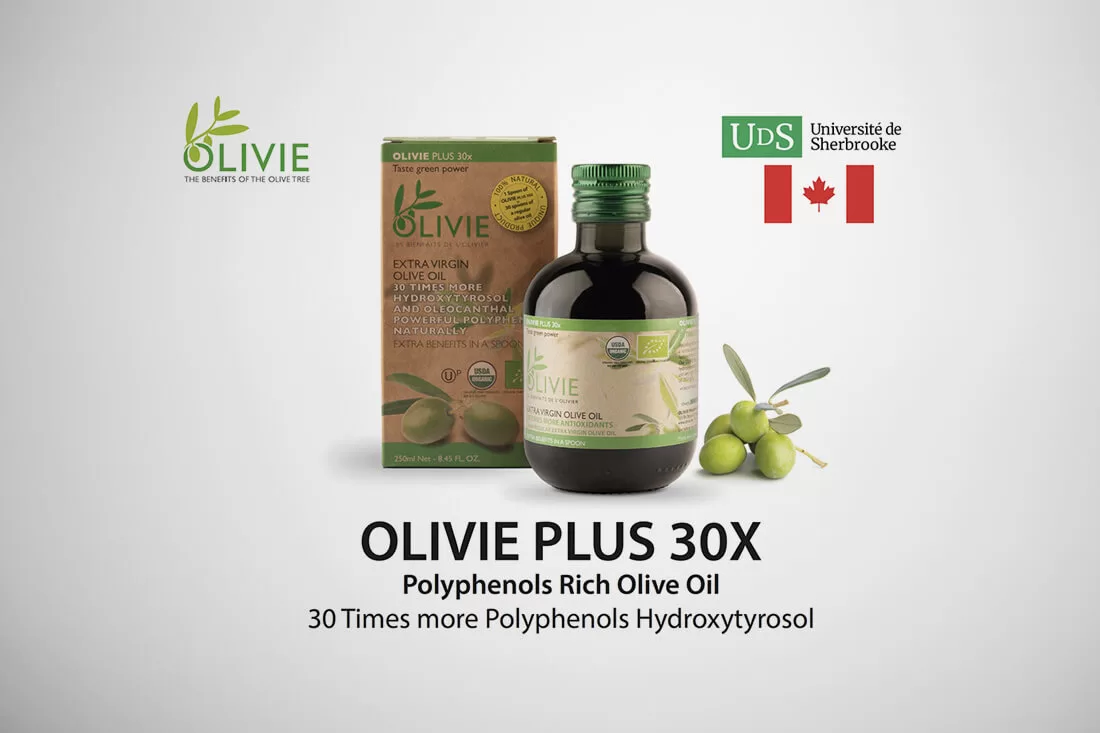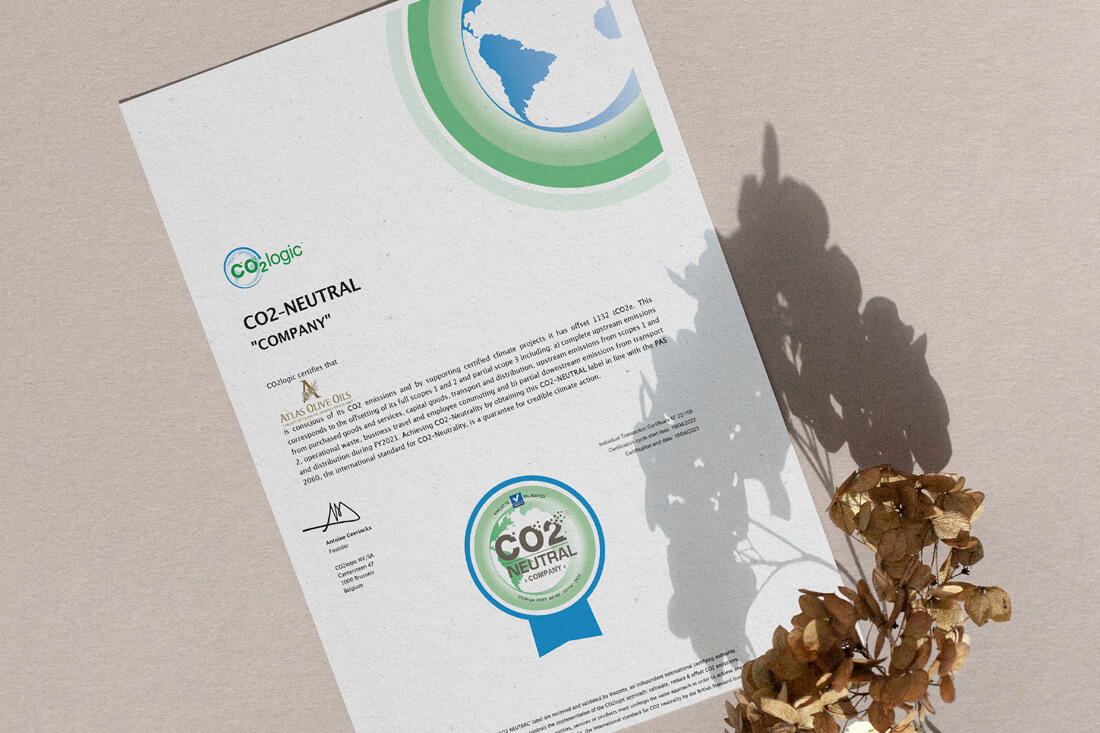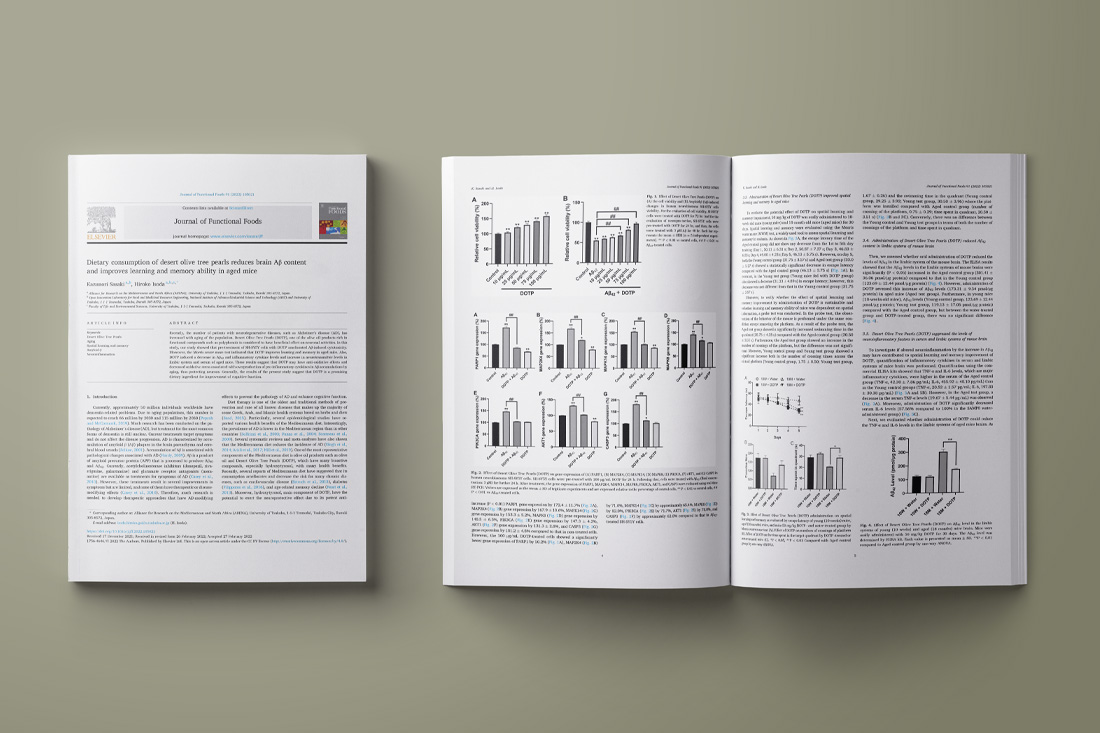POLYPHÉNOLS À ACTION ANTIOXYDANTE, ANTI-INFLAMMATOIRE, ANTI-CANCER, ANTI-ÂGE ET PROTECTION CARDIAQUE.
Nous avons réalisé plusieurs études cliniques sur la poudre des oliviers bio du désert : OLIVIE. Plus de 500 000 $ US dépensés dans la recherche et le développement pour votre bienfait. L’étude anti-inflammatoire sur les joints articulaires a coûté à elle seule 140 000 $ US. Dans les pages suivantes, vous trouverez les 8 études cliniques effectuées sur les produits OLIVIE.
En effet, les produits OLIVIE sont adossés à des sciences profondes au vu des 8 études cliniques réalisées sur:
– la baisse du taux de glycémie (diabète)
– la réduction de la douleur et de l’inflammation pour les patients souffrant d’inflammation des articulations (3 études réalisées dans ce cadre).
– la réduction de la croissance des tumeurs cancéreuses
– l’effet antimicrobien.
Enfin et surtout, l’histoire derrière cette poudre est unique:
La poudre OLIVIE provient d’oliviers certifiés bio souffrant dans un désert rocailleux. Tout comme la vigne, il est bien connu que l’olivier doit souffrir pour produire le meilleur de lui-même. Face à un environnement très chaud (jusqu’à 52°C en été), un sol rocailleux où les racines ne peuvent pas se développer aisément, un manque d’eau, les oliviers stressent. Il se produit un phénomène de panique dans l’arbre (instinct de survie et phénomène d’autodéfense) qui se traduit par une production anormalement élevée de polyphénols (antioxydants). Ces antioxydants, produits à cause de cet environnement hostile, sont plus actifs, plus puissants et nous ont permis d’obtenir d’excellents résultats (illustrés par nos études cliniques) pour un effet anti-inflammatoire, antidouleur, antidiabétique et antimicrobien, antivieillissement et protecteur cardio-vasculaire.
ETUDE CLINIQUE N° 1
IN THE COURSE OF PUBLICATION IN A RENOWNED SCIENTIFIC REVIEW.
Supplementation with a rich polyphenols olive tree powder reduces circulating inflammatory markers, disease activity, and pain intensity in patients with rheumatoid arthritis: a 9-week randomized, double-blind, placebo-controlled clinical trial.
Dr. Shavon Jackson-Michel, Director of Medical and Scientic Affairs – D. O. Company, United States of America (USA).
Ghanam Jamal and Benlemlih Mohammed, Biotechnology Laboratory, Faculty of Science Dhar El Mahraz, P.O. Box 1796, Atlas-Fez, University Sidi Mohammed Ben Abdellah, Fez, Morocco.
ABSTRACT
Background- Notwithstanding the way that olive fruits polyphenols and olive leafs polyphenols have been known for their natural anti-inflammatory effect in the Mediterranean countries, there is little deep scientific study to confirm these benefits.
Objective- To assess the effect of rich-polyphenols olive tree powder (made of leafs, baby leafs, olive fruit and olive oil) made from olive trees planted in the middle of a rocky desert on inflammatory process and pain intensity, a randomized, double-blinded, placebo-controlled trial was conducted on human subjects with rheumatoid arthritis (RA).
Methods- Seventy-nine RA patients were randomized to get either 1 g per day of olive tree powder or 1 g of placebo powder during 9 weeks. Laboratory analysis, questionnaires administration, pain intensity, disease activity score, and inflammatory biomarkers were determined at the baseline and at the end of the trial.
Specialists have monitored eventual side effects and antagonistic impacts of taking the olive tree powder through the period of the study.
Results- Good compliance (over 95%) with the treatment was observed, without any side effect or study intervention adverse. Significant decrease in disease activity score has shown at the end of intervention within the treated group, and between groups (P<0.0001). Compared with the placebo group, inflammatory biomarkers decreased significantly in treated participants (P<0.0001). Here are the changes noticed from baseline in treated group were -1.25 mg/L (CI, -1.75 to -0.75), -2.09 pg/mL (CI, -2.63 to -1.54), -0.82 pg/mL (CI, -1.14 to -0.49) and -1769 pg/mL (CI, -2254 to -1283) for hs-CRP, IL-6, TNF-α and PGE2 respectively. Additionally, it is important to note that pain relief and global participants satisfaction increased significantly (P<0.0001) after 9 weeks of olive tree powder supplementation.
Conclusion- A net improvement in circulating inflammatory markers, disease activity, and pain intensity was observed in RA patients allocated to rich-polyphenols olive tree powder food supplement.
Keywords: Rheumatoid arthritis; olive tree powder; Inflammatory biomarkers; Pain intensity; Disease activity.
ETUDE CLINIQUE N° 2
Supplementation with rich polyphenols olive tree powder improves fasting blood glucose and insulin resistance in patients with type 2 diabetes mellitus: a 14-weeks randomized, double-blind, placebo-controlled clinical trial.
Jamal GHANAM & Mohammed BENLEMLIH*
Biotechnology Laboratory, Faculty of Science Dhar El Mahraz, P.O. Box 1796, Atlas-Fez, University Sidi Mohammed Ben Abdellah, Fez, Morocco.
*Corresponding author: Benlemlih Mohammed
ABSTRACT
Background- Despite the fact that olive tree extracts have been used for long time as antidiabetics in Mediterranean folk medicine, there are few studies on olive polyphenols providing support to this view.
Objectif- To assess the effect of rich-polyphenols olive extract on glucose metabolism and cardiovascular risk factors, a randomized, double-blinded, placebocontrolled trial was conducted in human subjects with type 2 diabetes.
Methods- Eighty T2D patients were randomized to receive either a daily dose of 3 g of olive tree powder (6 capsules, 500 mg each) or placebo during 14 weeks. Anthropometric measures, glucose and insulin profiles, lipid profile and questionnaires administration were determined at the baseline and at the end of the trial. Doctors assessed potential adverse effects of olive tree powder through the period of study.
Results- Good compliance (over 94%) with the treatment was observed, without any study-intervention adverse and without any side effect observed. The lipid profile levels of treated group decrease significantly (p < 0.0001 vs. placebo group), while the value of HDLcholesterol raise to 51.5 ± 9.4 mg/dL (p = 0.007 vs. placebo). The daily administration of rich-polyphenols olive tree powder results in a significant reduction (vs. placebo) in HbA1c (p < 0.0001), fasting glucose (p < 0.0001), insulin resistance (p = 0.0002). The average value of fasting glucose decreases to 114.2 ± 15.2 mg/dL, which is under to the normal range defined by the American Diabetic Association.
Conclusion- The supplementation with a richpolyphenols powder from the olive tree was associated in a net improvement in fasting plasma glucose, insulin resistance and lipid profile in subjects with type 2 diabetes, suggesting the potential therapeutic effect of this extract
as an antidiabetic.
Keywords: Type 2 diabetes mellitus; Olive tree powder; Olive tree extract; Glucose control; Randomized clinical trial.
ETUDE CLINIQUE N° 3
Hypoglycemic and hypolipidemic effects of phenolic olive tree extract in streptozotocin diabetic rats
Wafa Laaboudi*, Jamal Ghanam1, Oumaima Ghoumari1, Fatiha Sounni1, Mohammed Merzouki1, Mohamed Benlemlih1
1Biotechnology, Laboratory, Faculty of Science, Dhar, El Mahraz, University Sidi Mohamed, Ben Abdellah – Fez – Morocco
ABSTRACT
Objective- The aim of the present study was to determine the effects of an olive tree extract with high polyphenols content on blood glucose level and other related parameters in streptozotocin-induced diabetic rats.
Methods- Diabetes was induced in rats by intraperitoneal injection of streptozotocin (55 mg/kg bw). 72h after injection, rats with fasting blood glucose higher than 2 g/l were used for the experiments. Olive tree extract was administered for 28 d and blood glucose level was measured every 4 d. Total cholesterol, triglycerides, HDL-cholesterol, creatinine, urea, total protein, uric acid, aspartate aminotransferase and alanine aminotransferase
levels, were determined at the end of the experiment.
Results- The oral administration of olive tree extract contributes to blood glucose level decreasing in diabetic rats group, which was significantly lower at 4th week compared to the diabetic control rats. Moreover, supplementation by olive tree extract decreased significantly (p<0.05) the values of total cholesterol, triglycerides, HDL-cholesterol, creatinine, urea, total protein, uric acid, aspartate aminotransferase and alanine aminotransferase resulting from damage caused by streptozotocin treatment. Beside this, significant reduce (p<0.05) in heart disease risk ratio was observed for treated group (4.1±0.14) compared to untreated group (7.64±0.36), which was quite similar to normal rats (4.50±0.36). Studied olive tree extract effects were similar to those of glibenclamide, a well-known antidiabetic drug.
Conclusion- Results herein obtained reveal the hypoglycemic effect of this olive tree extract, suggesting his potential use as a natural antidiabetic agent.
Keywords: Olive leaves, Olive fruit, Polyphenols, Antidiabetic, Streptozotocin, In vivo.
ETUDE CLINIQUE N° 4
Anti-inflammatory and analgesic activities of olive tree extract
Wafa Laaboudi*, Jamal Ghanam1, Hala Aissam1, Mohammed Merzouki1, Mohamed Benlemlih1
1Biotechnology Laboratory, Faculty of Science Dhar El Mahraz, University Sidi Mohamed Ben Abdellah – Fez – Morocco
ABSTRACT
Objectif- The aim of this study was the in vivo evaluation of analgesic and anti-inflammatory effect of an olive tree extract with high polyphenols content.
Methods- This olive tree extract was obtained from Moroccan olive fruits and leaves using an eco-extraction free of chemical solvents and toxic additives. Antiinflammatory activity was evaluated using carrageenan and histamine-induced paw edema methods. Analgesic activity of the olive tree extract was estimated against a hot plate, acetic acid induced writhing and formalin tests.
Results- The extracts showed significant antiinflammatory and analgesic activities with a dosedependent manner. Anti-inflammatory activity of olive tree extract at 250 and 500 mg/kg doses was more important compared to the used standard drugs (p<0.05), in both carrageenan and histamine-induced paw edema tests. In analgesic assays, results showed that 500 mg/kg dose of olive tree extract has a significant analgesic effect through both peripheral and central mechanisms.
Conclusion- Our findings suggest that olive tree extract is safe and has potential anti-inflammatory and analgesic activities, which promote this use as a food supplement against pain and inflammation related to inflammatory diseases.
Keywords: Olive leaves, Olive fruit, Polyphenols, Anti-inflammatory, and Analgesic, In vivo.
ETUDE CLINIQUE N° 5
Eco-Extraction of Phenolic Compounds from Moroccan Olive Fruits and Leaves and their Potential use as Antimicrobial Agents
Wafa Laaboudi
Corresponding Author, Biotechnology Laboratory, Faculty of Science Dhar El Mahraz University Sidi Mohamed Ben Abdellah – Fez – Morocco
Jamal Ghanam
Biotechnology Laboratory, Faculty of Science Dhar El Mahraz University Sidi Mohamed Ben Abdellah – Fez – Morocco
Mohammed Merzouki
Biotechnology Laboratory, Faculty of Science Dhar El Mahraz University Sidi Mohamed Ben Abdellah – Fez – Morocco
Mohamed Benlemlih
Biotechnology Laboratory, Faculty of Science Dhar El Mahraz University Sidi Mohamed Ben Abdellah – Fez – Morocco
ABSTRACT
In Morocco, the olive harvest generates regenerates a lot of waste such as leaves and olive fruits. Valuation by the extraction of polyphenols from this
waste could be a promising source. In our work, we have prepared an olive tree extract from this waste, our extract contains 148 g/l of polyphenols, 8.4 g/l of flavonoids and 39.11 g/l of o-diphenols. Polyphenols, major natural antioxidants play a key role in hundreds biological reactions. The antioxidant activity test revealed great antioxidant potential of our extract with high ORAC value 3 848 100 μmol Te/kg. The present work has as objective to evaluate the antimicrobial activity. The olive tree extract showed broad- spectrum antibacterial activity against Escherichia coli, Escherichia coli TG1, Escherichia
coli DH5α, Staphylococcus aureus, Bacillus cereus, Bacillus cereus MED5 and Streptococcus agalactiae. While pure phenolic compounds (caffeic acid, ascorbic
acid and quercetin) showed more limited activity. The antifungal effect of the olive tree extract exceed the antibiotics at a concentration of 3 mg/disc (p<0.05). Industrial technology can therefore exploit this extract, rich in polyphenols, in order to use instead of a synthetic antioxidants and antibiotics that could be dangerous. This would lead Morocco to enhance the olive harvest waste as an important economic source.
Keywords: Olive leaves; Olive fruit; Polyphenols; Antioxidants; Antibacterial; Antifungal.
ETUDE CLINIQUE N° 6
Anticancer effect of an olive tree extract through his cytotoxic, antioxidant and antiangiogenic activities
Laure Eloy2, Thierry CRESTEIL2,3, Jamal GHANAM1, Wafa LAABOUDI1, and Mohammed BENLEMLIH1
1Biotechnology Laboratory, Faculty of Science Dhar El Mahraz University Sidi Mohamed Ben Abdellah, P.O. Box 1796 Atlas, Fez-Morocco.
2ICSN-CNRS UPR 2301, Avenue de la terrasse, 91190 Gif sur Yvette, France.
3IPSIT, Faculté de Pharmacie, Université Paris Sud, 92290 Chatenay-Malabry, France.
ABSTRACT
The aim of the current study was to evaluate the anticancerous potential of a phenolic olive tree extract through his cytotoxic, antioxidant and antiangiogenic
activities. The in vitro cytotoxic activity of a crude olive tree extract and his major constitutive components has been evaluated against human KB, HL60 cancer cell lines using MTS and flow cytometry. ROS production was estimated with the DCFH- DA assay. Antiangiogenic activity was evaluated in vitro on endothelial cells tube formation and the pro-angiogenic factor expression was quantified using qRT-PCR. In vitro cellular assays have demonstrated the cytotoxic effect of the crude olive tree extract. This extract reduces significantly (p<0.05) ROS produced in cells exposed to oxidative stress. Beside this, olive tree extract has demonstrated a strong anti-angiogenic activity, which was correlated with a significant decrease (p<0.05) in VEGF, angiopoietin and HIF1α expression. Basically, the evaluation of anti- proliferative, antioxidant and antiangiogenic activities could be the first step to formulate an efficient pharmaceutical product with preventive and/ or curative properties against cancer.
Key words: Olive tree extract; Anticancerous; Cytotoxic; Antioxidant; Antiangiogenic.
ETUDE CLINIQUE N° 7
Effects of rich polyphenols olive tree extract on inflammation and pain in patients with rheumatoid arthritis:
A-8-week randomized, double-blind, placebo-controlled clinical trial
Ghanam Jamal, Laaboudi W and Benlemlih M*
Biotechnology Laboratory, Faculty of Science Dhar El Mahraz, P.O. Box 1796, Atlas-Fez, University Sidi Mohammed Ben Abdellah, Fez, Morocco.
ABSTRACT
Olive tree polyphenols have been known as natural anti-inflammatory agents. The aim of the current clinical trial was to assess the therapeutic effect of an olive tree extract with high polyphenols content on inflammatory processand pain intensity in rheumatoid arthritis (RA) patients. This is a randomized, double-blind, placebo-controlled clinical trial. Ninety RA patients were randomized into two groups; treated group received a daily dose of 3 g of olive extract (6 capsules, 500 mg each) during 8 weeks, while patients in placebo group received capsules with maltodextrin. Laboratory analysis, questionnaires administration, pain intensity, and inflammatory biomarkers were determined at the baseline and the end of the trial. Doctors assessed potential adverse effects of olive tree extract through the period of study. Significant decrease in disease activity score has shown at the end of intervention in the treated group and between groups (P<0.0001). Compared to the placebo group, inflammatory biomarkers decreased significantly in treated participants (P<0.0001). The changes from baseline in treated group were -1.37 mg/L
(CI, – 2.71 to -1.57 mg/L), -2.14 pg/mL (CI, -2.71 to -1.57), -1.046 pg/mL (CI, -1.50 to -0.59) and -1795 pg/ mL (CI, -2283 to -1308) for hs-CRP, IL-6, TNF-α and PGE2 respectively. Pain relief and global participants satisfaction increased significantly (P<0.0001) after 8 weeks of olive
tree extract supplementation. Results obtained after 2 months of supplementation demonstrate for the first time the potential therapeutic effect of olive tree extract with high polyphenols content against inflammation and associated pain in RA.
ETUDE CLINIQUE N° 8
A breakthrough discovery was made by the reputed Japanese Tsukuba University Hospital on Olivie PowerUp desert Olivie tree pearls. Proven effects to prevent Alzheimer disease, to boost memory and cognitive anti-aging effects are now proven! Follow us…
Kazunori Sasakia,b, Hiroko Isodaa,b,c
a Alliance for Research on the Mediterranean and North Africa (ARENA), University of Tsukuba, 1-1-1 Tennodai, Tsukuba, Ibaraki 305-8572, Japan
b Open Innovation Laboratory for Food and Medicinal Resource Engineering, National Institute of Advanced Industrial Science and Technology (AIST) and University of Tsukuba, 1-1-1 Tennodai, Tsukuba, Ibaraki 305-8572, Japan
c Faculty of Life and Environmental Sciences, University of Tsukuba, 1-1-1 Tennodai, Tsukuba, Ibaraki 305-8572, Japan
ABSTRACT
Recently, the number of patients with neurodegenerative diseases, such as Alzheimer’s disease (AD), has increased with aging of the population. Desert Olive Tree Pearls (DOTP), one of the olive oil products rich in functional compounds such as polyphenols is considered to have beneficial effect on neuronal activities. In this study, our study showed that pre-treatment of SH-SY5Y cells with DOTP ameliorated Aβ-induced cytotoxicity. Moreover, the Morris water maze test indicated that DOTP improves learning and memory in aged mice. Also, DOTP induced a decrease in Aβ42 and inflammatory cytokine levels and increase in neurotransmitter levels in limbic system and serum of aged mice. These results suggest that DOTP may have anti-oxidative effects and decreased oxidative stress associated with overproduction of pro-inflammatory cytokines in Aβ accumulations by aging, thus protecting neurons. Generally, the results of the present study suggest that DOTP is a promising dietary ingredient for improvement of cognitive function.
ETUDE CLINIQUE N° 9
La Faculté de Médecine a réalisé au Canada et pendant 6 mois une étude clinique cardiovasculaire utilisant l’huile d’olive très riche en polyphénols OLIVIE PLUS 30X.
Professeur Abdelouahed KHALIL, Ph. D.
Département de Médecine, Faculté de Médecine et des Sciences de la Santé, Université de Sherbrooke – Canada
ABSTRACT
Conclusion: L’inflammation des artères et la microcalcification étaient DE LOIN INFÉRIEURS lors de l’utilisation de OLIVIE PLUS 30X comparé à l’utilisation d’une huile d’olive extra vierge ordinaire.






